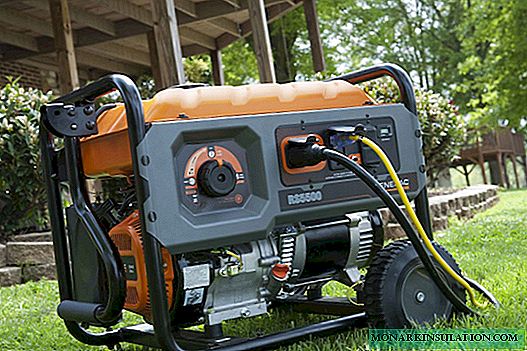
You should not hope that the state will soon please us with high-quality power supply - without interruptions and power surges. Permanent accidents on power lines are the costs of a dear power grid, laid down even during the time of the electrification of Russia in the 1920s according to the GOELRO plan. Apparently, the communist government did not include electrification of the hinterland, so it often remained so - without centralized power supply to this day. What to do under the circumstances, a summer resident spoiled by the benefits of technological progress, which simply refuse to function without electricity? Not to return to the old-fashioned ways of lighting - torches, oil lamps and candles? The only right decision is to create an autonomous power supply for your garden plot using a generator, which can become either a permanent or emergency source of energy. Here's just how to choose this miracle of technology - a backfill question for many who have come across terms such as volts and amperes last time in high school. If you just want to gather useful information and don’t know where to go, don’t despair, we will help you quickly figure out this seemingly impossible task.
What is a fuel power generator?
A fuel power generator is a kind of mini power station that operates autonomously. What is necessary for its functioning? A small amount of fuel - gasoline, diesel fuel or gas, which is consumed within 0.5 liters to produce 1 kW / h depending on the power of the generator. You just pour the combustible mixture into the tank, from where it enters the internal combustion chamber. Using a spark, the mixture is ignited and the thermal energy that is released during combustion is converted into electricity.
If you are thinking about buying a generator, then first of all decide what type of fuel it should work on. Technical parameters and features of the generator depend on this, such as: power, noise, mobility, durability, price, and others.
So, you need to choose among the generators that are most often used to power houses, namely gasoline, diesel and gas. Gas generators are not as widespread as generators running on gasoline and diesel fuel, due to their high cost, cumbersomeness and the need to connect to the main gas supply system. Therefore, the choice of a generator for a house in the country, by and large, comes down to a decision - it will be a gas or diesel source of electricity.
Diesel Generator: Pros and Cons
Before you start picking up a generator, decide which source of electricity you need - permanent or temporary (seasonal, emergency). If you operate the cottage all year round, then the best option would be a diesel generator - it is more suitable for continuous operation than gasoline. In addition, its margin of safety is higher - a diesel unit will last you longer than a generator running on gasoline. And yet, the line of modifications of diesel generators includes more powerful models than gasoline power plants - this circumstance will allow you to connect a larger number of electrical appliances to the diesel engine.

When choosing a generator, determine whether you will use it seasonally or year-round and calculate the load - the power of connected household appliances
Do not forget to take into account that diesel fuel is a cheaper type of fuel than gasoline, and when the house is constantly connected to the generator, a lot of combustible mixture will be needed. So the use of a gasoline generator can result in a pretty penny.
What are the negative aspects of using a diesel generator? First of all, units for power supply on diesel fuel cost a decent amount - from 20 thousand rubles. up to 1 million rubles and higher. Although a little reassuring is the fact that the initial capital investment in a diesel generator quickly pays for itself. Another inconvenience that you will encounter during the operation of a powerful diesel power plant is the high noise level, which requires the allocation of a separate room with a well-thought-out system of sound insulation and forced ventilation.

High noise of powerful diesel generators and exhaust gases generated during their operation, forced to place this equipment outside the house
Careful ventilation is also necessary in the case of using a gasoline generator - you should not forget that the principle of operation of these units is similar to the operation of a car engine, and this is inevitably accompanied by the formation of exhaust gases. Only the combustion products of diesel fuel are more caustic than gasoline and make it more serious to equip a system for removing volatile toxic substances.
A good option to help solve this problem is to install a diesel generator outside the house. But such a decision entails the need to equip a canopy and a system for locking equipment to protect against theft.

High power diesel engines are large in size and are available as stationary equipment
Starting gasoline generators is possible at a temperature of minus 20 degrees Celsius, diesel - not lower than minus 5 degrees. A significant drawback of diesel generators is the difficulty of starting at low temperatures, which is extremely important for our climatic conditions. However, there are models of stationary units on diesel fuel in a protective casing that allows you to place this equipment on the street and receive electricity regardless of cold weather.
In general, to summarize our thoughts, the purchase of a diesel generator will be a reasonable decision if the cottage is used year-round or equipped with a large number of electrical appliances.
Pros and Cons of a Gasoline Generator
How to choose a generator if the cottage is used seasonally or if your site is connected to the central power supply and requires a backup power supply? With such input data, the most rational way of organizing autonomous power supply of a summer cottage will be a gasoline generator, attracting with its low cost in the range from 3 to 50 thousand rubles, sometimes higher. It is a gasoline generator that will best cope with small loads in a small cottage, not stuffed with a wide range of electrical appliances.

Relatively light weight - up to 100 kg, compactness and mobility contribute to the fact that gasoline generators are most often used to power cottages
The cost of a gasoline-driven generator depends on the power of the unit, engine characteristics, gas mileage, and the manufacturer. On average, the price of a diesel generator is twice the price of a gasoline analogue of the same power.
If you need to perform any work on the site that requires a connection to the mains, you can easily move the gasoline generator - as a rule, the mass of such an aggregate is small, it is quite compact and mobile. An insignificant level of noise produced by the generator on gasoline allows its placement in the room and does not require additional sound insulation. So if you are faced with a dilemma about which generator to take for seasonal use, buy a gasoline version - and you will not lose.

A gasoline generator is the best option for seasonal supply of electricity to the cottages
The noise level of gasoline generators is about 50 decibels, diesel - from 80 to 100 decibels.
If we talk about the generator as a backup source of electricity - in case of a sudden outage of centralized power supply, then a gasoline generator would also be the best choice. Having invested minimal money in the purchase of a low power gasoline generator, it will not be so offensive if you use it a few times during the summer season.
How to choose the unit of the required power?
If we talk about such a generator indicator as productivity, then the power range of gasoline generators ranges from 0.6 to 7 kW. Practice shows that to supply electricity to a small country house, a 1 kW installation is enough. Such a unit will pull modest lighting, a TV, a refrigerator, a small gas boiler and a low-power well pump. If the set of electrical appliances is wider, then you may need a gasoline generator with a capacity of 3 kW or more. As for manufacturers, the maximum reliability will provide the purchase of equipment on gasoline produced by Honda, Subaru, Kohler.

When choosing a generator for power supply at home, pay attention to its power - it will depend on it how many electrical appliances you can connect
Selecting the power of the electric generator, summarize the rated power of all electrical appliances in your home and add an additional 30% - the power reserve for peak loads that occur when you turn on the refrigerator, washing machine, borehole pump, power tools and other powerful electrical appliances. Another important point for reflection is the cost of 1 kW per hour generated by a 5 kW unit on gasoline will be about 8 rubles, on diesel - about 6 rubles, on gas - 4.5 rubles.
For country estates equipped with the maximum possible set of technical systems, a gasoline generator is not suitable. Therefore, the question arises, which diesel unit will behave better as an autonomous power plant? Based on experience, a power of about 10 kW will be enough for an advanced country house with a full “ammunition” of household appliances, a centrifugal pump and a gas boiler, a video surveillance system and automatic gates. Among manufacturers of diesel power plants, companies Yanmar, Deutz, Isuzu, Honda, Kohler stand out.
Gas generators have recently gained increasing popularity among owners of private houses. The power of this equipment varies from 0.8 to 24 kW and allows you to flexibly choose the installation that meets the needs of your summer cottage. The gas generators from Reg, Gazlux, Greenpower, Mirkon, Kohler, Honda are enjoying constant success.

In the conditions of a summer residence, the compact and mobile power generator will be the best option - you can easily transfer it around the territory to perform various chores
Summarizing all of the above, when buying a generator, decide for what purpose you need it, estimate the power consumption and select the type of fuel on which the unit will operate.











